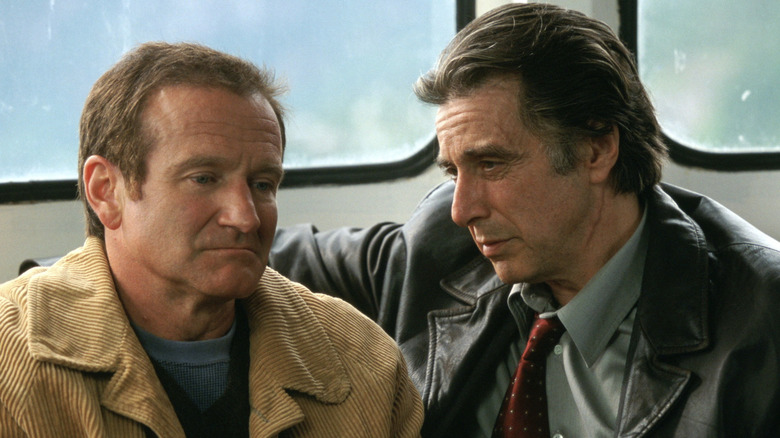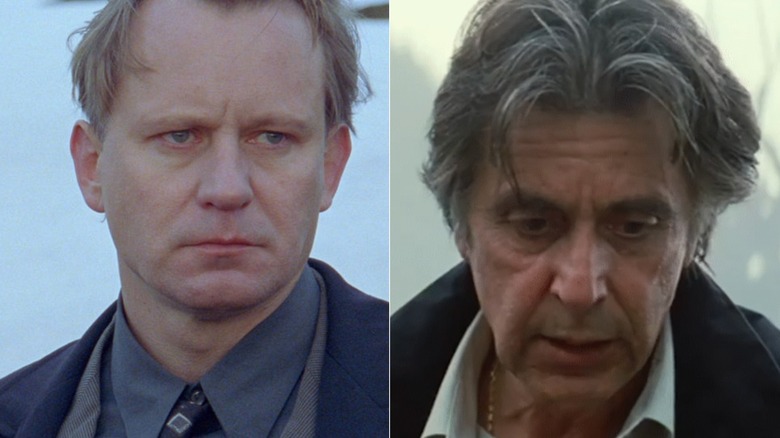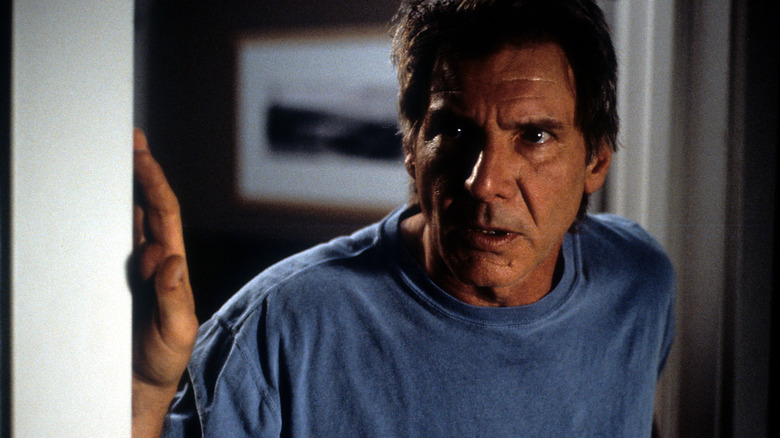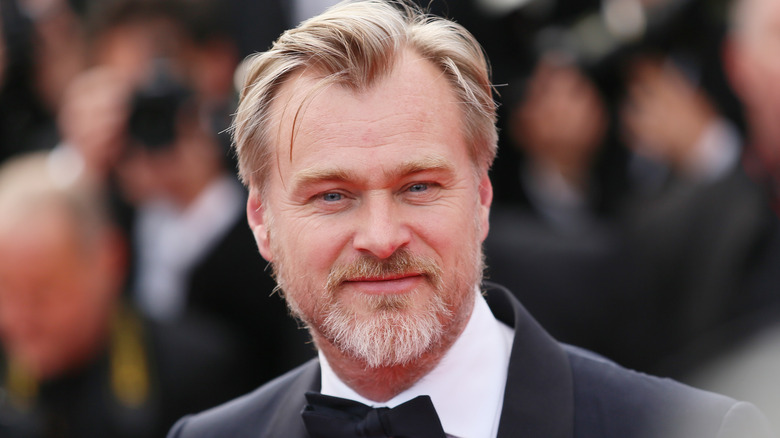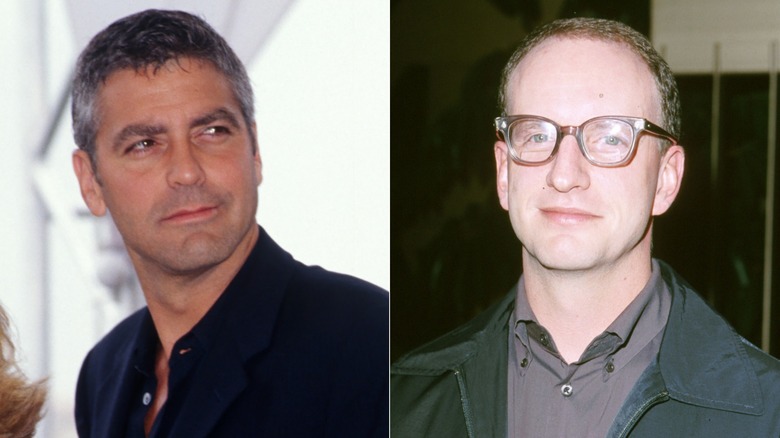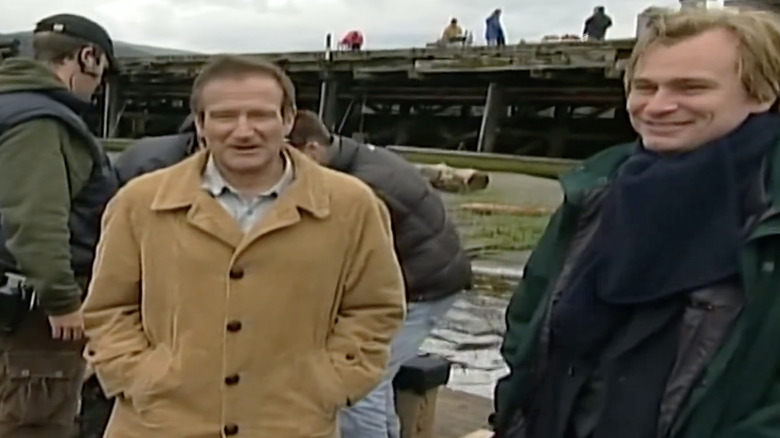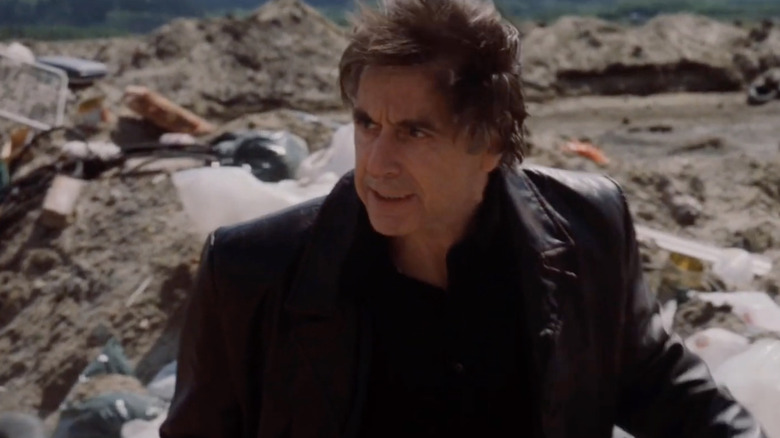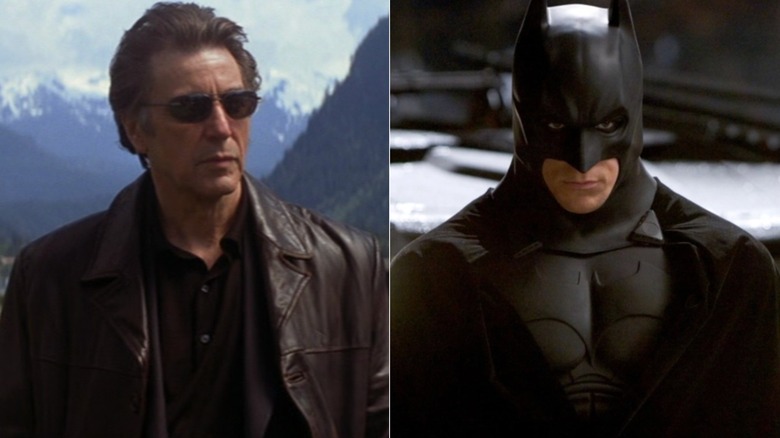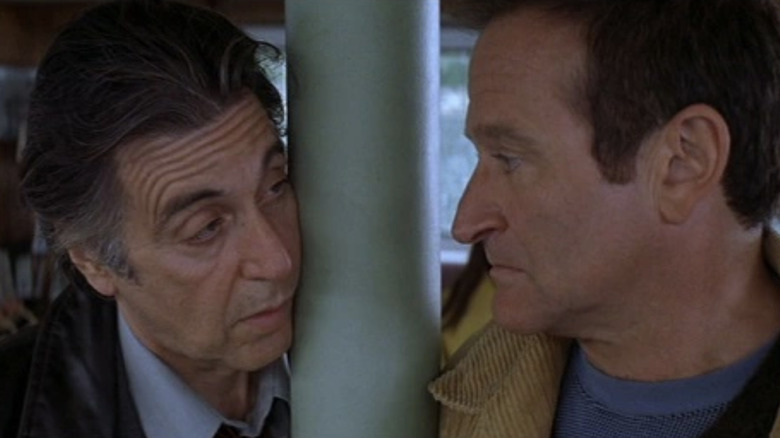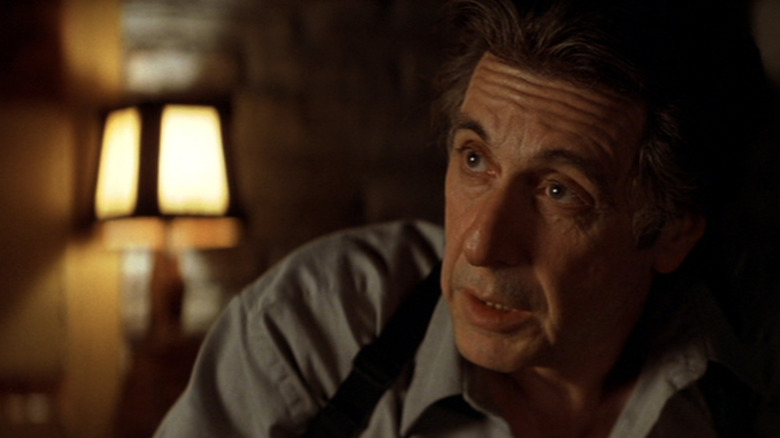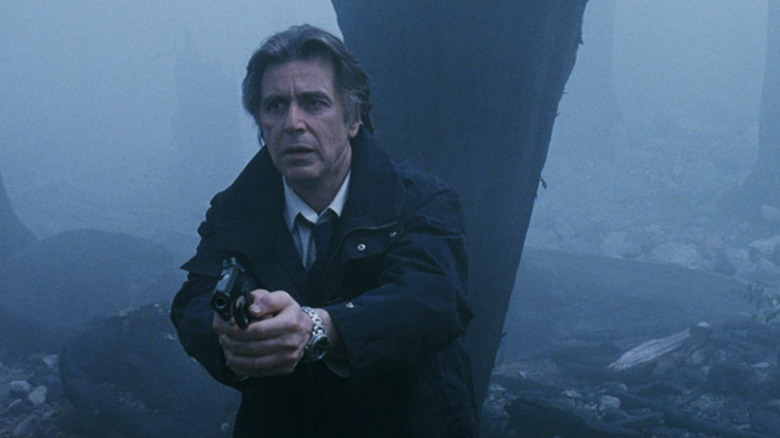The Untold Truth Of Insomnia (2002)
At the turn of the century, Christopher Nolan only had two feature films to his name: the independent neo-noir "Following" and the psychological thriller "Memento." But, in 2002, another project came about that the director tackled head-on, and though it's unlike most of his work, it's remained a cult classic among fans of the filmmaker. That's right, we're talking about none other than "Insomnia," the psychological thriller that starred Al Pacino, Robin Williams, and Hilary Swank and is set in Nightmute, Alaska, a place where the sun doesn't set.
Described back in 2002 by film critic Lou Lumenick as "the meatiest performances Al Pacino and Robin Williams have given in many years," "Insomnia" is an intimate look at a recurring theme of Nolan's — namely that one can lose themselves in their pursuit of what's right. As Pacino's Detective Will Dormer and Williams' author-turned-murderer Walter Finch circle one another, the lines between right and wrong, fact and fiction, become blurred, and no one will ever be the same.
His last R-rated picture before he directed "Oppenheimer," "Insomnia" is the perfect blend of Nolan's indie thriller roots combined with the studio blockbuster style that would later define his career. It has everything from suspense and drama to morally ambiguous characters and exceptional performances. But there's more to this psychological thriller and its production than you might expect. So don't close your eyes, because we're about to dive head-first into the untold truth of Christopher Nolan's "Insomnia."
Insomnia is actually a remake
Perhaps unsurprisingly, "Insomnia" isn't an entirely original production. Rather, it's a remake of the 1997 Norwegian film of the same name directed by Erik Skjoldbjærg. Like the remake, the original "Insomnia" is set in a snowy town watched by endless daylight, just on another continent. Deep in the arctic town of Tromsø, Norway, the film covers the same events as the Hollywood remake, albeit with a different cast. None other than Stellan Skarsgård stars in the role taken by Al Pacino in the remake, while Bjørn Floberg plays the role later succeeded by Robin Williams.
Film critic Roger Ebert compared Christopher Nolan's remake favorably to the original. "Unlike most remakes, the Nolan 'Insomnia' is not a pale retread," he wrote, "but a re-examination of the material, like a new production of a good play." Likewise, original "Insomnia" director Skjoldbjærg praised Nolan's vision when talking with Film Works in 2014. "I felt lucky that it's such a well crafted, smart film and that it had a really good director handling it," he remarked, "because as a remake I think it did really well and it doesn't hurt any original if a remake is well done. So I felt I was lucky that Christopher Nolan took it upon himself to do it."
Both versions were well-received by audiences and critics alike, which isn't surprising given the universal nature and themes of the "Insomnia" story. To date, it's Christopher Nolan's only remake.
Insomnia could've been very different
Long before Christopher Nolan was attached to direct, and even before Al Pacino was cast as the leading man, "Insomnia" was a project that could have gone in a completely different direction. In late 2000, IGN reported that Harrison Ford was interested in the project, per initial reports by a September issue of Entertainment Weekly magazine. After the actor passed on the fourth (and his third) Jack Ryan film, "The Sum of All Fears," Ford was looking for a new project to tackle, and "Insomnia" seemingly caught his eye.
Additionally, "The Silence of the Lambs" director Jonathan Demme was being courted to helm the picture, which would've marked his first-ever collaboration with Ford. No doubt, a Jonathan Demme-directed "Insomnia" would've looked vastly different than Nolan's eventual vision, especially if Harrison Ford played Detective Will Dormer in place of Pacino. But less than six months later, Pacino and Nolan were locked in for "Insomnia," sending Ford and Demme to work on "K-19: The Widowmaker" and "The Truth About Charlie" respectively. The pair never did collaborate.
Interestingly, Ford was no stranger to the psychological or crime thriller genres, and during that time starred in a number of them, including "What Lies Beneath" and "The Devil's Own." Despite this, the studio went with Al Pacino in the leading role, likely based on his stunning performance as Los Angeles cop Lt. Vincent Hanna in "Heat." No question, it was the right choice.
It's the only Christopher Nolan movie that he didn't help write
Known best for his non-linear visions, Christopher Nolan generally maintains an enormous amount of creative control over his motion pictures, including the screenplay. Before "Insomnia," Nolan wrote the screenplay for both of his previous features, "Following" and "Memento" — but for his first studio production, he stuck strictly to directing. Given that "Insomnia" was in the works even before Nolan took the helm, his contributions to the thriller were largely (but not entirely) limited to the director's chair.
Instead, the screenplay for "Insomnia" was written by Hillary Seitz based on the screenplay for the original Norwegian film written by Nikolaj Frobenius and Erik Skjoldbjærg. Once on the project, the director reportedly collaborated with Seitz on several drafts, but evidently not enough to receive a writing credit himself. Regardless, Nolan praised Seitz's script, as noted in the making-of documentary "Day for Night." "[The script was] just tremendous," he remarked, "and it really tapped into all the things I hoped an American remake would."
In a 2002 interview with ShowBizMonkey, Nolan expressed that, although he did have some say on the script, he was happy to let Seitz do her work. "I found it very liberating as a director to have the benefit of someone else's characterization and words on the page to build on," he recounted. Despite his liberation, Nolan opted to write (or co-write) every one of his future productions, from his next feature "Batman Begins" all the way to "Oppenheimer."
George Clooney and Steven Soderbergh were executive producers
Aside from the stars who drew audiences to theaters for "Insomnia," such as Al Pacino, Robin Williams, and Hilary Swank, there are two other big names that helped Christopher Nolan get his 2002 thriller made. Despite not appearing on camera, George Clooney sports an executive producer credit in the film alongside director Steven Soderbergh. Both were involved in the production through their now-defunct production company Section Eight Productions, and helped Nolan to achieve his full potential as a big-shot studio filmmaker.
In the making-of documentary "Day for Night," Soderbergh explained that his attraction to the film was its distinct transition from whodunnit to "how-dunnit" to "why-dunnit." Thankful for their guidance, Nolan was proud to have worked with the pair. "They have been extraordinarily helpful in guiding me through my first studio film experience," Nolan insisted when speaking with ShowBizMonkey. "It has been a tremendously valuable collaboration." Of course, Clooney and Soderberg weren't exactly hands-on; it was still Nolan's movie after all, and they all shared the same vision.
When asked if Clooney was ever meant to play the part of Will Dormer, Nolan revealed that Clooney never saw himself in the role and they had all agreed adamantly on Al Pacino's casting. Unfortunately, Nolan has yet to cast Clooney in any of his future projects, and "Insomnia" remains the only sort-of collaboration between the two. Maybe one day, Nolan will find the right role for his former executive producer.
Nolan fought to direct the project
Since "Insomnia" didn't originate in Christopher Nolan's brain or in the pages of a DC comic book, the director had to fight for his chance to direct Warner Bros.' latest thriller. Having first seen the original "Insomnia" when it was released in 1997, Nolan was instantly intrigued when he heard that a Hollywood remake was in the works. Having only made his 1998 debut "Following" — which he wrote, directed, and co-produced — Nolan didn't exactly have the robust portfolio that a major Hollywood studio might require before tackling such a project.
"I first approached Warner Bros. about the project before any script was written," the director revealed in an interview with ShowBizMonkeys. "I hadn't made 'Memento' at that point so I really wasn't in a good position to get involved." After finishing "Memento," the studio was finally willing to hire him for the project, and soon, he began working closely with screenwriter Hillary Seitz to bring the story to life. "I found the studio environment to be very productive," he said. "That does come from working with the right producers and executives. I felt very supported in everything we tried to do with the film."
Around the same time, Nolan was working on a Howard Hughes biopic that would've starred Jim Carrey in the leading role, but that project quickly dissolved. Instead, Nolan continued with Warner Bros. to reboot Batman following "Insomnia," and his career was never the same.
The midnight sun holds a double meaning
In parts of Alaska, there's a phenomenon called the "midnight sun." It happens in places north of the Arctic Circle, where the sun doesn't set for extended periods of time. This can also be a result of time zones and daylight savings, albeit still in the northernmost parts of the globe. In "Insomnia," Will Dormer suffers from the titular condition upon arriving in Nightmute, Alaska. Because of the daytime feel, even in the dead of night, Dormer can't sleep peacefully. But that's not the only reason. Upon killing his partner Hap (Martin Donovan), Dormer remains unable to sleep.
"[Cinematographer Wally Pfister] and I wanted to convey this sense of an omnipresent light, that seeps in everywhere and is a constant reminder of danger, guilt and the threat of exposure," Nolan said in the production notes recorded by The Robin Williams Fansite. Like a searchlight hoping to catch a convict, the midnight sun scours Nightmute in search of Dormer, hoping to find him out. In the scene where Dormer is found yelling in his hotel room, claiming that it's too bright, he soon realizes that he can't hide much longer.
Not only is the movie's never-ending daylight an interesting gimmick that sets the film apart, its presence as part of the narrative, and Dormer's struggle, makes it one of the most useful ones to date. If darkness usually covers one's sins, then the ever-present light from above is meant to expose Dormer's.
Nolan's first studio film readied him for Batman
As Christopher Nolan's first mid-budget studio picture — the film was only made on $46 million — "Insomnia" was the filmmaker's gateway into big-budget, blockbuster filmmaking. Not only did the 2002 thriller mark the beginning of Nolan's nearly two-decade-long relationship with Warner Bros., it solidified him as an impressive filmmaker worthy of the keys to an even bigger kingdom. That kingdom just so happened to be the Batman franchise, making his very next feature 2005's "Batman Begins."
"Getting my feet wet in the studio system and doing a medium-budget studio thriller, and taking on what to me was a lot of responsibility, that was the best possible training and the best possible middle step I could've had for then going on to a large-scale franchise movie," Nolan told Forbes in 2015 while reflecting on the 10 year anniversary of "Batman Begins." No doubt, his work on "Insomnia," working with actors such as Al Pacino and Robin Williams, gave Nolan the experience (and likely the confidence) to tackle what is often considered the definitive on-screen version of Batman.
Since "Insomnia," Nolan has only directed one more mid-budget production — the period thriller "The Prestige" — before hitting gold with 2008's Batman follow-up "The Dark Knight" and its eventual 2012 sequel. Having sparked new life into Warner Bros.' biggest superhero property, the studio gave him the green light to tackle his own original ideas from that point onward.
Robin Williams broke the ice with Al Pacino
Warner Bros. couldn't have cast two more different actors for the parts of Will Dormer and Walter Finch. While Al Pacino is an inspired casting choice, Robin Williams stands out as an unusual addition, especially given his generally loving and comedic nature. But Williams delivers as the crime author-turned-murderer Finch, frightening audiences as a result. So, how could two actors who approach acting so differently work so well together? Well, according to Williams, it's because they still met in the same place.
Though they only had a few scenes together, Pacino and Williams developed an insatiable chemistry on screen. "My first day working with Al ... he does this method thing where before every take he would roar like a lion. So my first day working with him I bleated like a goat," Williams told Empire writer Owen Williams when reflecting on his time on "Insomnia." Understandably, Pacino responded with confusion, to which Williams simply replied, "It's me, Al, it's Robin, I was just kidding."
Before his death in 2014, Williams hoped to work with director Christopher Nolan again, possibly in a Batman sequel as the Riddler. "I've been screwed twice on that," he remarked. "Years ago they offered me the Joker then gave it to Jack Nicholson, then they offered me the Riddler and gave it to Jim Carrey." That would've been quite the performance.
Working with Pacino helped Nolan understand acting
There's no doubt that Christopher Nolan is a master director. He can pull career-defining performances out of any actor and has the clear confidence to do so. But "Insomnia" marked his first time directing big-name stars, and no matter who you are, that's no small task. Directing his third feature film, Nolan was still relatively new to feature filmmaking and was certainly new to working with a big-time Hollywood studio. Nevertheless, working with Al Pacino helped Nolan better understand his craft, and prepare himself for future endeavors.
"I had gone up to Pacino after a series of takes and given him a note on what I wanted," Nolan told The Los Angeles Times in 2023. "He told me, 'I've already done that. You can't see it to the eye, but I've done it on the dailies.' I looked for it and I was like, 'Oh, my God,' because there it was." Of course, not every actor is Al Pacino, but all of the best ones have more going on than one can pick up on initially.
This experience during "Insomnia" aided Nolan on future projects, including "Oppenheimer." In the interview, he even compared his experience with Pacino to a more recent one with Cillian Murphy, explaining that Murphy had quite a lot of intensity bubbling beneath the surface than what he initially saw on set. "Great film actors can do that," Nolan remarked. Indeed, they can.
Christopher Nolan believes it's his most underrated film
Given that "Insomnia" isn't the most recognizable addition to Christopher Nolan's filmography, it's easy to overlook the first installment of his unofficial "IN" trilogy (did he think we wouldn't notice his recurring naming convention after "Inception" and "Interstellar"?). Despite the big names attached and its box-office success, Nolan's Alaskan thriller has taken a backseat compared to some of his larger productions; the small-scale intimacy of his 2002 picture has long been forgotten following the likes of "The Dark Knight Trilogy," "Interstellar," and "Tenet."
Even so, many of Nolan's regularly recycled themes — such as obsession, moral ambiguity, and the loss of one's self — are clearly spotted in "Insomnia," and while it's certainly the outlier in his greater body of work, it still holds a special place in the director's heart. "I'm very proud of the film. I think, of all my films, it's probably the most underrated," Nolan explained in Tom Shone's book "The Nolan Variations." "The reality is it's one of my most personal films in terms of what it was to make it."
Though we're unlikely to ever see Nolan tackle another medium-budget-sized thriller again, "Insomnia" is still an excellent time capsule for the filmmaker's easiest years. Who knows, maybe one day he'll revisit his crime thriller roots and direct a small-scale feature with less sci-fi spectacle and more substance. And no, "Oppenheimer" doesn't even remotely count.
